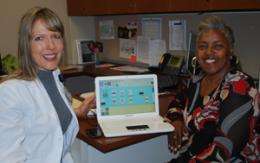New device provides 'voice' for patients who can't speak

When Vernia Moore suffered a stroke she took full stock of her functions in the recovery room. Arms and hands moving? Check. Legs and feet okay? Check. Memory intact, with full comprehension? Check, check. All seemed good, but when the nurse asked her a simple question, the words would just not come. Though her brain was trying to speak, Moore was literally at a loss for words.
“This is not an uncommon situation and it is not just related to stroke victims,” says Brenda Abraham, a speech language pathologist at Methodist Sugar Land Hospital. “It can be a result of a brain injury or other traumatic event and it can affect young and old. Too many people are left with cognitive ability intact, but without communication skills. These patients lack a practical way to ask for directions, express their feelings, or phone a friend — things we take for granted each day.”
Fortunately for Moore, her physician, Dr. Julie Hung, referred her to the Speech Pathology Department at MSLH for evaluation. Working with Moore, Abraham recognized that she was a good candidate for the Lingraphica, a speech-generating device that is easier to use and more understandable than many alternative communication (AAC) devices available on the market.
The Lingraphica is a speech-generating device that has been specifically designed for people with aphasia (impairment in the ability to use or comprehend words) and apraxia (difficulty executing the movement patterns necessary to produce speech even though there is no paralysis or weakness of speech muscles).
The device is the size of a laptop. It has a touch screen with graphics relating to everyday life. There are frequently used phrases and words stored in each of the graphic folders so that when the user needs to communicate – say, for instance, to ask for a piece of toast – he or she simply touches the “kitchen” button to find or build the phrase. The device then speaks the words for the patient.
“There’s also an application that patients can download onto their iPods allowing them to carry certain phrases with them without the bulk of the bigger device,” says Abraham.
One of the most exciting things about the Lingraphica, according to Abraham, is that insurance coverage is often available for AAC devices.
“Before she received the Lingraphica, Vernia would have to find alternative ways to communicate and they weren’t always effective,” says Abraham. “For example, she was in our office and wanted to explain to the receptionist that her address had changed. She showed the receptionist her driver’s license, but the receptionist did not understand what Vernia was trying to tell her. With the Lingraphica, we have been able to build her a library of phrases to encompass those types of things.”
Most recently, Abraham helped her patient build phrases that would allow her to independently phone her doctor’s office.
“For the first time in three years, Vernia was able to schedule her own appointment,” says Abraham. “From the look on her face, you would have thought she had just won the lottery.”
Moore is not the only patient Abraham is assisting with the Lingraphica. MSLH neurologist Dr. Muhammad Khan recently referred stroke patient Bertha Silva to her for help with communication. Silva has quickly become accustomed to using the device. In fact, by the end of her first training session, she was already building a library of phrases with the help of her husband.
While the Lingraphica is an amazing tool for many, Abraham cautions that AAC devices are not appropriate for every patient. “Many of these people will recover full use of their speech,” she explains. “But for others with limited or slow return of their speech ability, a trial period with a device such as the Lingraphica can be very helpful.”

















